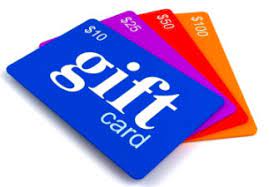
Since 2015, 332 scams reported to the BBB Serving Metro New York have indicated that the scammer requested payment through gift cards or reloadable cards; and 98 of these scams have been reported to BBB Metro NY since January 2020. Consumers should view a request for payment by gift card as a warning sign. A new BBB study shows that gift cards are increasingly popular as a payment method for scams.
“Transactions that request payment by gift card are almost always scams,” said Claire Rosenzweig, President and CEO of the BBB Serving Metro New York. “Gift cards don’t carry the same protections as credit or debit cards, so gift card payments are funds you can’t get back.”
An in-depth investigative study by Better Business Bureau (BBB) finds an increase in reports of scams involving gift cards, with hundreds of millions of dollars in losses over the last few years. The study -- Gift Card Payment Scams: BBB Reveals Why Scammers Love Gift Cards -- looks at the scope of fraud involving gift cards as a payment method, the way various cards work, the scammers who exploit them, the efforts to combat the scams and steps the industry could take to further tack address this growing problem. Read the full study here.
According to the study, payment by gift card is a common thread among many scams that have been the subject of previous BBB studies, including government impersonators, business email compromise frauds, tech support frauds, romance scams, fake check scams, prize/sweepstakes scams, and online sales of nonexistent vehicles.
In Metro New York, since 2015, the most prevalent category of scams where a gift card or reloadable card is requested as part of the scheme is employment scams, with 115 scam reports. Two other scam categories which consumers frequently reported this type of tactic being used are sweepstakes/prize/lottery scams (40 reports) and advance fee loan scams (38 reports). In addition to the categories outlined previously, this type of scam is frequently reported to BBB Serving Metro NY under the following variety of classifications: debt collections, fake check/money order, fake invoice/supplier bill, government grant, online purchases, phishing, romance, tax collection, tech support, and utility.
Available data suggests that gift card payment scams are growing fast. The losses reported to BBB Scam Tracker for this payment type nearly tripled between 2017 and 2020, with a median claimed loss of $700 in 2020; consumers over 65 were more likely to lose money than younger consumers. The Federal Trade Commission (FTC) reports that roughly one in four people who lost money to a scam not related to an online purchase paid with a gift card, with reported losses of $245 million since 2017 in complaints made directly to the FTC.
Typically, when gift cards are requested as payment in scams, the scammer instructs the consumer to buy a gift card -- or several -- and either read the numbers on the back over the phone or send a photo of the numbers on the back. If victims ask questions about why gift cards are being used for payment, scammers invent a plausible excuse, such as that the government has recently entered a contract with a gift card company to handle transactions. Commonly requested gift cards include eBay, Google Play, Target, iTunes, Amazon, and Steam, an online gaming company. The scammer might promise to reimburse the consumer later or may send a check in advance for the consumer to deposit. In reality, the funds do not materialize or the check is invalid, and the consumer has lost the funds forever.
Red flags to know and avoid include:
- Government agencies requesting payment. No government agency requests payment through gift cards.
- Statements that buying gift cards is a safe way to make a payment. Providing the numbers for a gift card is like sending cash, and the money is rarely recoverable. Gift card payment requests are a big red flag for a scam.
- Keep the receipt when buying a gift card. Keep the physical card as well. These may help prove that the card was paid for and activated if problems arise later.
- Inspect the card carefully before buying it to be sure it has not been tampered with. Some scammers open the card to get the numbers on the back so that they can take the money when the card is later activated.
Who to contact if you are the victim of a gift card scam:
- Gift Card Issuer - Victims should immediately notify the issuer of the card as soon as they realize they bought gift cards and provided the numbers to scammers, or have purchased gift cards with no balance on them. There is typically a customer service number on the back of the card.
- Better Business Bureau - file a complaint with your local BBB if you lost money or report a scam online at BBB.org/scamtracker.
- Federal Trade Commission (FTC) - file a complaint online at reportfraud.ftc.gov or call 877-FTC-Help.
- Internet Crime Complaint enter (IC3) - file a complaint online at ic3.gov/complaint.
- Consumer Financial Protection Agency – file a complaint online at consumerfinance.gov/complaint or call (855) 411-2372.
- Canadian Anti Fraud Centre - file a report online at antifraudcentre-centreantifraude.ca or call 1-888-495-8501.
- Canadian Financial Consumer Agency to file a report online about prepaid or reloadable cards in Canada
ABOUT BBB: For more than 100 years, the Better Business Bureau has been helping people find businesses and charities they can trust. In 2020, people turned to BBB more than 220 million times for BBB Business Profiles on 6.2 million businesses and Charity Reports on 11,000 charities, all available for free at BBB.org. There are local, independent BBBs across the United States, Canada and Mexico, including BBB Serving Metropolitan New York, which was founded in 1922 and serves New York City, Long Island, and the Mid-Hudson region. Visit BBB.org for more information.